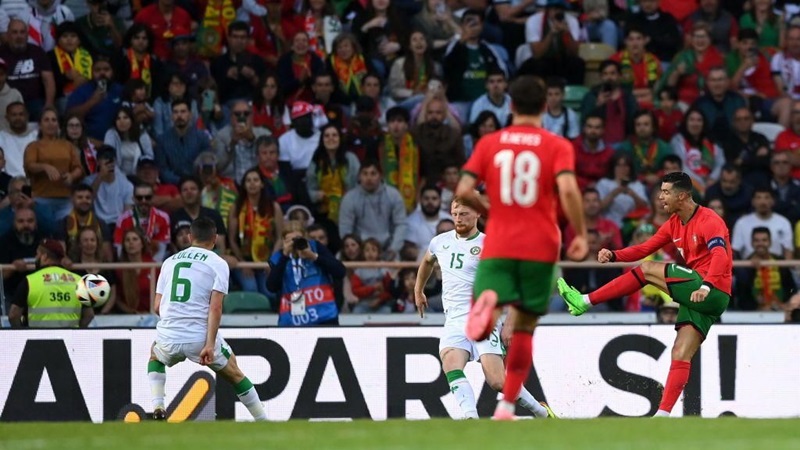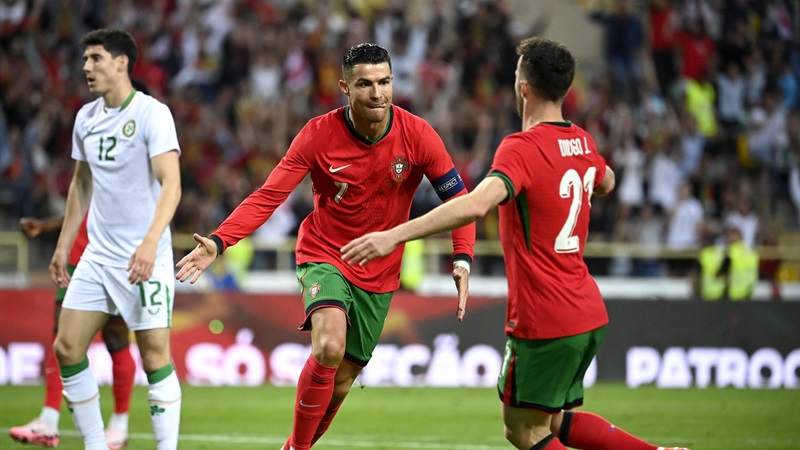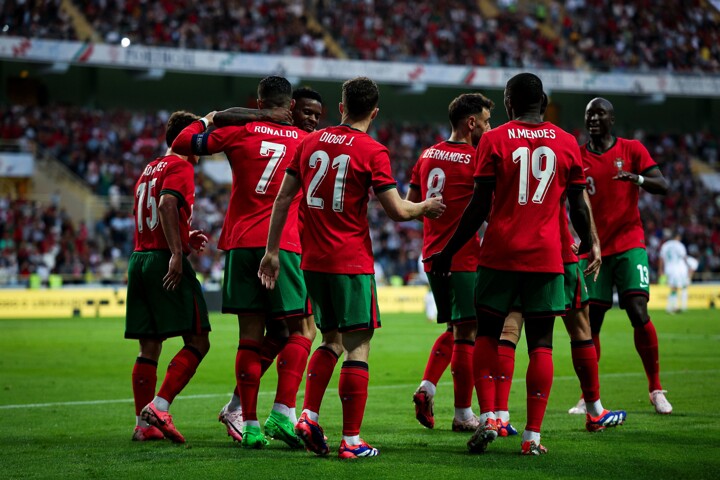In an exhilarating international friendly match, Portugal outshone the Republic of Ireland with a decisive 3-0 victory. The match, held at the Estádio Algarve, saw Portugal display a sublime performance, demonstrating their superior skills and tactics. The Portuguese team, steered by their iconic forward Cristiano Ronaldo, showed unyielding dominance throughout the match, leaving the Irish team struggling to keep up.
The first half of the match was a testament to Portugal’s attacking prowess, as they managed to effortlessly break through Ireland’s defence and secure two goals. The opening goal was a brilliant strike from Diogo Jota, who capitalized on a precise cross from Bruno Fernandes. The second goal came from André Silva, who found the back of the net with a well-placed shot, further extending Portugal’s lead before the half-time whistle.
The second half saw the Republic of Ireland attempting to strike back, but Portugal’s robust defence and agile goalkeeper, Rui Patrício, thwarted their efforts. The Irish team tried to create opportunities and exploit gaps in Portugal’s defence, but their attempts were met with strong resistance. In spite of their spirited performance, they were unable to make a significant impact on the scoreboard.
The final nail in the coffin for the Republic of Ireland came in the form of a third goal from Cristiano Ronaldo. Ronaldo, known for his exceptional athleticism and goal-scoring instincts, lived up to his reputation by delivering a spectacular goal in the final minutes of the match. The goal was a classic Ronaldo move – a swift, powerful shot that left the Irish goalkeeper with no chance of making a save.
The 3-0 triumph was not just a victory for the Portuguese team, but also a reflection of their preparation and dedication. The team’s cohesion and collective effort were evident, with each player contributing towards this significant win. Their offensive tactics were executed with precision, while their defence remained solid throughout the match.
For the Republic of Ireland, this match was a learning experience. Despite the loss, their performance showcased their potential and resilience. The Irish team demonstrated their ability to compete at a high level and, although they were unable to match Portugal’s strength on this occasion, they showed signs of promise for future matches.
In conclusion, the international friendly match between Portugal and the Republic of Ireland was a display of top-class football, with Portugal emerging as the clear victors. It was a game that underlined Portugal’s readiness and potential for upcoming tournaments. On the other hand, despite the loss, the Republic of Ireland showed that they are a team capable of competing and improving. This match surely served as a valuable experience for both teams, providing insights into their strengths and areas for improvement as they prepare for their next matches.

Match Summary
The match summary serves as an essential snapshot of the game’s overall performance, providing in-depth details about the game’s events from the beginning till the end. It encapsulates the key highlights, vital statistics, and crucial turning points that significantly influenced the game’s outcome. This includes information about the teams, the players’ individual performance, goals scored, penalties, injuries, and substitutions as they help in analyzing the game more effectively.
The match summary gives a crystal clear picture of the team’s strategies and how effectively they were executed. It also provides insights into the strengths and weaknesses of each team and the areas they need to work on for future matches. This summary becomes a critical resource for teams to learn and improve, for coaches to strategize, and for fans to understand the game better. It also helps journalists and sports writers in crafting their articles or match reports.
Detailed match summaries play a crucial role in creating the narrative of the sport, enhancing the viewers’ understanding and appreciation of the game. They are a vital tool for those who missed the live-action and want to catch up with the game’s flow, making them feel as if they watched the match in real-time. The summary captures the essence of the match, providing a comprehensive overview of the game’s thrilling moments and significant details.
Highlights from Portugal’s Victory
Portugal’s victory in the world of football is a testament to their sheer determination, unyielding prowess, and the extraordinary talent they possess in this beloved sport. One of the most memorable highlights of their triumphs includes the unforgettable moment in the 2016 UEFA European Championship. Against all odds, Portugal emerged as the victorious team, marking their first major tournament win. The team’s star player, Cristiano Ronaldo, played an instrumental role in the victory, demonstrating his exceptional skills, agility, and precision. His leadership was pivotal, inspiring the team and leading them to a glorious win.
However, the victory was not only about Ronaldo. Eder, a substitute brought on during extra time, scored the winning goal, proving that every member of the team was indispensable and capable of making a significant contribution. The unity, teamwork, and indomitable spirit displayed by the Portuguese squad were truly remarkable, reinforcing the fact that football is a team sport above everything else.
Another noteworthy highlight was Portugal’s resiliency in overcoming adversities. Ronaldo was injured early in the final against France, but the team rallied together, showing an impressive level of resilience and determination to clinch the victory without their star player. This triumph was a testament to their collective strength and their ability to rise to the occasion during challenging times.
Portugal’s victory was also a celebration of strategic brilliance. The team’s coach, Fernando Santos, devised an effective game plan that was executed flawlessly by the players on the pitch. His tactical acumen and the players’ unwavering commitment to their roles contributed significantly to the victory.
In conclusion, Portugal’s victory was a thrilling blend of individual brilliance, teamwork, resilience, and strategic excellence. It was a remarkable achievement that will be remembered for years to come, not just by the Portuguese, but by football fans around the world.

Key Plays from the Republic of Ireland
Throughout the rich history of the Republic of Ireland, several key plays have left an indelible mark on the national cultural consciousness. These theatrical works have not only entertained audiences worldwide but have also shed light on the unique socio-political landscape of the country. The illustrious playwrights of Ireland have created pieces that tackle the complexities of Irish life, the intricacies of its history, and the resilience of its people.
One of the most renowned Irish plays is “Waiting for Godot” by Samuel Beckett. Premiered in 1953, this insightful piece delves into the themes of existentialism and the human condition, providing a profound perspective on life’s absurdity. Another notable work is “The Playboy of the Western World” by John Millington Synge, which caused a stir due to its controversial portrayal of rural Irish life when it was first staged in 1907. This play continues to be a staple of Irish theatre, revealing the tensions between tradition and modernity.
Sean O’Casey’s “The Plough and the Stars” is an essential part of Ireland’s theatrical canon, focusing on the 1916 Easter Rising, a pivotal event in the nation’s journey towards independence. The play brilliantly encapsulates the turmoil and excitement of the era. Equally compelling is Brian Friel’s “Translations,” which explores the cultural and linguistic tensions during the British ordnance survey of Ireland in the 19th century.
In more recent years, Enda Walsh’s “Disco Pigs” has captured the nuances of contemporary Irish youth, while Marina Carr’s “By the Bog of Cats” has offered a haunting reimagining of ancient Irish mythology. These plays, along with countless others, have contributed significantly to the global prestige of Irish theatre. They reflect the deep-rooted storytelling traditions and the dynamic creativity of the Republic of Ireland, showcasing the nation’s capacity to engage, challenge, and captivate audiences around the world.

Live Reporting
Live reporting refers to the real-time dissemination of news events as they unfold. This form of journalism is instrumental in keeping the public informed about the latest developments around the globe. Live reporters are typically on the ground, at the heart of the action, providing audiences with immediate access to events and occurrences. This journalistic format has become increasingly prevalent with the rise of broadcast and digital media.
One of the most appealing aspects of live reporting is its immediacy. Audiences are able to witness events as they happen, creating a sense of connection and immersion that pre-recorded or written news cannot replicate. This also allows for a level of transparency in news delivery, as viewers can see the situation for themselves without relying solely on a journalist’s interpretation.
However, live reporting also presents unique challenges. Reporters must be able to think on their feet, respond to changing situations, and deliver accurate information under high pressure. There is no room for significant errors or delays in live reporting, as these can lead to misinformation or confusion. Additionally, safety can be a concern when covering volatile situations such as natural disasters or conflicts.
Despite these challenges, live reporting plays a crucial role in today’s media landscape. It allows for a more immediate, engaging form of news delivery that keeps audiences informed and connected to the world around them. As technology continues to evolve, live reporting will likely become even more integral to our consumption of news.
